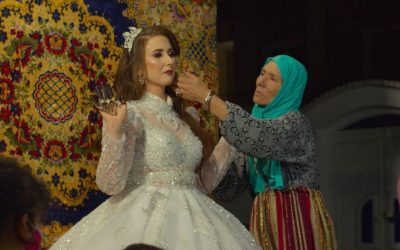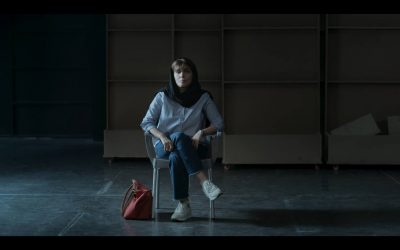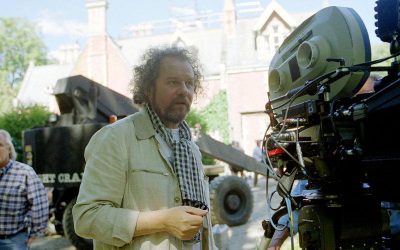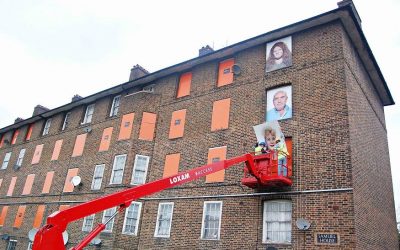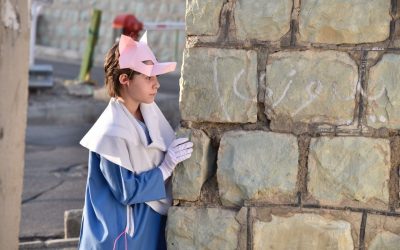Andrea Luka Zimmerman is a Jarman Award-winning artist and filmmaker whose multi-layered practice explores fragile refusals, counter memories and itinerant lives, human and otherwise, in relation to structural and political injustice. Andrea has directed five acclaimed feature length films: Taskafa, Stories of the Street (2013, written and voiced by the late John Berger), Estate, a Reverie (2015), Erase and Forget (2017), Artangel-produced Here for Life (2019) and The Wapping Project-produced Wayfaring Stranger (2024), all of which have screened widely around the world including at Berlinale, Locarno, IDFA, Istanbul, BAFICI and IFFR festivals, as well as in cinemas, galleries, and community spaces. Selected exhibitions include ‘Shelter in Place’, Estuary 2021, ‘Civil Rites’, the London Open, Whitechapel Gallery, ‘Common Ground’ at Spike Island, Bristol and ‘Real Estates’ at Peer Gallery. Selected writing includes extended essays in ‘Ways of Travelling’ (Qattan Foundation, Ramallah, forthcoming) ‘Strangers Within: Documentary as Encounter’, ‘Open Democracy’ and ‘Another Gaze’, among others, and co-editing the books ‘Estate: Art, Politics and Social Housing in Britain’ (Myrdle Court Press) and ‘Doorways: Women, Homelessness Trauma and Resistance’ (House Sparrow Press). Andrea’s films are held in the Arts Council England Collection, archives and libraries, and are distributed by LUX, Modern Films, Grasshopper Films and Second Run DVD. Andrea co-founded the cultural collectives Fugitive Images and Vision Machine (collaborators on Academy Award® nominated feature documentary ‘The Look of Silence’). This interview was completed on 13 February 2024.
- RedCut: You are an artist, filmmaker and cultural activist whose hybrid practice calls for a profound re-imagining of the relationship between people, place and ecology. Please tell us more about the ideas and intentions informing your work.
My work is inseparable from the social aspect of making. I am drawn to people who make a world in the ‘gaps’ of official records, and often these are people engaging in processes that go undocumented (often important to be such). There is a risk in doing this: a process of unmasking, undoing, redoing, finding and losing – and this is in stark contrast to histories of erasure or victorious stories of righteousness. It is a kind of practice of knowing that one is, in the words of Natalie Diaz, ‘of consequence’ – how are we of consequence to each other? Filmmaking, for me, is a form of encounter. I like the patience this has taught me. There is so much behind the moment before I even pick up a camera. When I do, I need to learn each time to see in ways that I don’t yet know. This is why I cannot work in more mainstream cultural production, especially in ‘documentary’ filmmaking where the stories one ‘seeks’ (for mainstream funders) are already pre-conceived. I come from a tricky background with a lot of violence and I didn’t finish school, so the option I was presented with was to remain in customer service (my first job was in Burger King), but I knew I wanted to become a filmmaker. I am saying this only because I still work with people who come to their making from such origins, to people who have a life first and foremost that they then tell from; not, as is so present in mainstream filmmaking factories, making films about people or situations. I came to London from Germany when I was 21. Being from a different language, people cannot identify my class from how I speak. In the UK, language is groomed by public schools that, by a perverse language turn, are private. Here I could go to art school, and it changed my life. I didn’t go to film school but was lucky to have had a thoroughly political film education that was less interested in the Hollywood canon than the rebellious and poetic cinema made in the majority world. I fell deeply in love with cinema as a collective tool to exchange feelings and ideas. We, all of us, are often seen, or rendered visible only as we are represented, and sometimes we even become how we are seen to be. By this I mean trapped within preconceived perceptions; for example, the way in which films depict gender, or a working-class person or an unhoused person, and of course we know that this is deeply problematic. So, in committed making, there is the possibility of discomfort, of having to ‘grieve’ the loss of your perception of the other. To know that the process of encounter, for it to become commitment, takes courage and time. And also, to realise that one can never fully understand how a place shapes one, but to understand how structures fix or prohibit certain forms of meeting one another, and to strive to overcome this nonetheless.
- RedCut: How is the relationship between human presence and location/geography depicted in your films?
My films seek to work and represent ecologically; all is connected, and the place is as much a character as a performer or other life forms might be. This way of making is part of the meaning conjured by the making. I am interested in how structures attempt to deny life, and how other forms of expression than standardised ones allow us to see in different ways, making counter memories.
- RedCut: How do you analyse the relationship between power structures and capitalism with independent cinema and independent thought?
I am struck by the ongoing internationalisation of aesthetics in film festivals, resulting in many lively discussions on the need to fail, to refuse standardised forms of meaning-making, to work with an imperfect form. The majority of films now look the same regardless of where they are made, because the funding demands, market and technical requirements, modes of making and theories behind definition / structure / intention / commercial potential (whether mainstream or arthouse) are the same, aligning with what filmmaker and theorist Peter Watkins some decades earlier, in relation to television – and especially the news – termed the ‘monoform’.
- RedCut: The film industry is perceived as a behemoth, one of the most expensive artforms in the world. In this context, how do you perceive the role of independent and low-budget cinema? As a low-budget filmmaker, how do you manage your life to make films?
As an artist one is told, either directly or implicitly, that to be funded one has to deliver a certain kind of work. If one is established, then their recurrent signature style is desired, even imposed. If one is emerging, then there might appear to be more openness as to what one’s acceptable style might be. However, I think this is broadly an illusion, as any genuine challenge to frameworks of representation, either though participation, collaboration or the breakdown of social boundaries, of class, economy and geography, is almost never tolerated. So, there is the imposed opposition between the offer of resource or scarcity, and this is artificial, especially as there are so many resources that are never shared. When it comes to solidarity, those with most backing are sometimes the ones most unwilling, or afraid to share them. I believe in abundance (collaboration, exchange, and mutuality) because what is most valuable and necessary cannot be financialized or even considered in such terms. Making modestly – with less – does not mean a reduction in creative ambition or imagination, but is an acknowledgement of necessary limits, socially and ecologically.
- RedCut: Do you think there are solutions, spaces, and opportunities for the growth and advancement of independent cinema today, and if so, what suggestions do you propose?
I believe any film or arts funding body needs to be peopled by artists and filmmakers of diverse gender, ethnicity, age and ability, while always remaining alert to the likelihood that not everyone is yet around the table. Funding panels need to be supported to take time to choose works and provide genuine feedback and encouragement for those who are not yet granted support. Panel selectors need to be changed every few years to avoid fixed perceptions taking root. All the budgets should be way more modest. Instead of funding say five films at three million GBP, national bodies should fund – and actively support the circulation of – 150 films for 100.000, and then employment in the ‘industry’ would remain more constant, and many more films would be made, creating a genuine film culture and shared ‘national’ cinema. There should be core funding for many smaller production companies, places where filmmakers can go and develop or edit their work in for free. The Belgian model in this case is excellent. If films need to cost more, people can of course fundraise, but there’s enough not to have to hustle at every corner. And there should be innovative distribution for work, and again it should be led by filmmakers and supported structurally. Only then will we have a diversity of visions, not just those created for sale on international markets.
- RedCut: Why did you go to Palestine, and how were your experiences as a filmmaker and observer?
The first time I visited was on the invitation of writer Adania Shibli, for mentoring at Ramallah Doc. Then I received a four-year residency in honour of John Berger, called ‘Ways of Travelling’, at the Qattan Foundation, Ramallah. The residency was also looking at the beautiful concept and practice of hospitality, ‘Haq al-Diyafah’, the right to hospitality as a guest. How not to be a tourist or activist repeating the same tropes that have been imposed on Palestine is a really important part of this residency. It has been very critical to have this extended time to research and develop networks of collaboration and exchange. And a lot of the work I have been engaged in there is not for wider public consumption – workshops with filmmakers and conversations are the foundation for friendships and commitment. There will be outcomes, including an essay film, but I am very aware of how and when to present this, as now is not the time as a guest to rush such things, especially when the voices of those living through this assault need to be foregrounded and supported where we can.

Andrea Luka
- RedCut: How do you feel now about the genocide of the Palestinian people? As a filmmaker whose work has explored the experience of war, how do you analyse the current situation?
The difficult thing is to identify points of resistance to structures of power, which is nearly total now, in terms of media control, surveillance and military capability. I had a conversation with someone about how institutions are only as good, only as open, as the people that run them. So many of those people are now running scared and running silent. They are fearful of saying the wrong thing, even it’s right.
- RedCut: Today, the handheld cameras of the people in Palestine are telling the truth and exposing the crimes of Israel. Do you think this harrowing historical experience will change the language of cinema? How do you see the responsibility of artists, filmmakers, and cinema in the face of this atrocity?
A deeply rigorous and ethical poetics is present there, that has a claim on beauty and obstinacy, on relation and connection. There are also many layers to Palestinian experience, including people who have joint Jewish and Arab / Palestinian heritage. We need not to reinforce binaries but strive for a mutual and enduring sense of justice, liveability and self-determination for all. And Palestinian filmmakers and artists should not be forced by wider cultural gatekeepers to retell only violence upon violence, as endless as it presents itself, at the expense of their larger lived experience. This is another form of control, however ‘supportive’ it might at first appear. Even mourning is politicised, and lives reduced in the mainstream western media.
- RedCut: Many artists and filmmakers that are pro-Palestine have been ‘cancelled’ around the world, such at the Frankfurt Book Fair, where Adania Shibli was to be honoured for her third novel, A Minor Detail. 12 years in the writing, this slim novel deals with the rape and murder of a young Bedouin woman by Israeli soldiers in 1949. In a press release, the author denies the statements made by the LiProm association in which they claimed that this decision was made in agreement with her, and asserts that this choice was an imposition. Shibli’s cancellation provoked strong reactions in the literary world. There have been many, many others across all artforms internationally. How do you think we can resist this? What is your opinion on BDS?
I know what it means to be unwelcome, and this is something that I draw on in moments where spaciousness is needed for others’ lives, and not just for a film or project. It is crucial to be sensitive to this, and to know that life comes first; for me, in any case. I think we need to also focus on the places that have opened up, that have deepened the connections across thresholds and between solidarities. There has been such care and kindness for each other, regardless of background, in the fundraising and solidarity initiatives. Like you have said to me, it’s also about knowing when to make space for other voices instead of taking up space. For me it is not about Palestine alone, or the (terrifying) rise of the far right / Islamophobia in Germany, or any other single issue or movement as such. It is about aligning oneself with a world that says, ‘not in my name’, a world not dependent upon the manufacture and export of industries of death. It is about wanting and showing up for a liveable world, about demanding that for each other, and never giving up.


